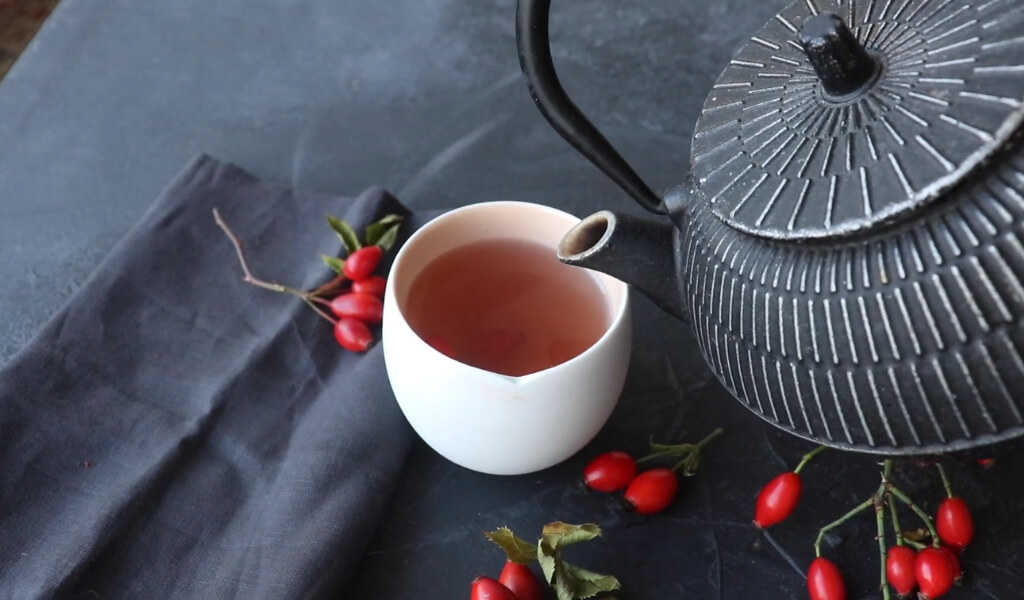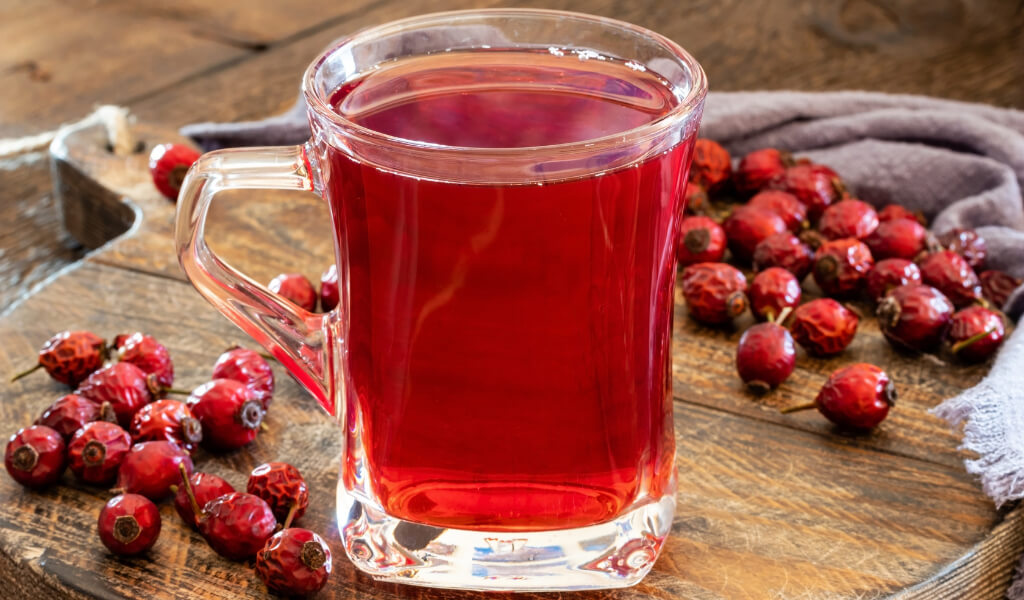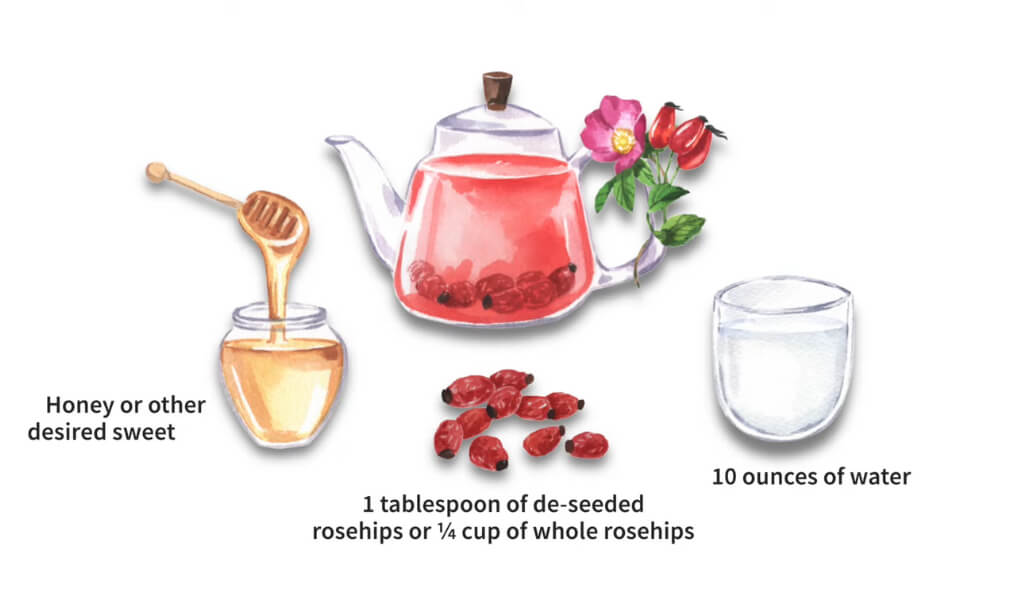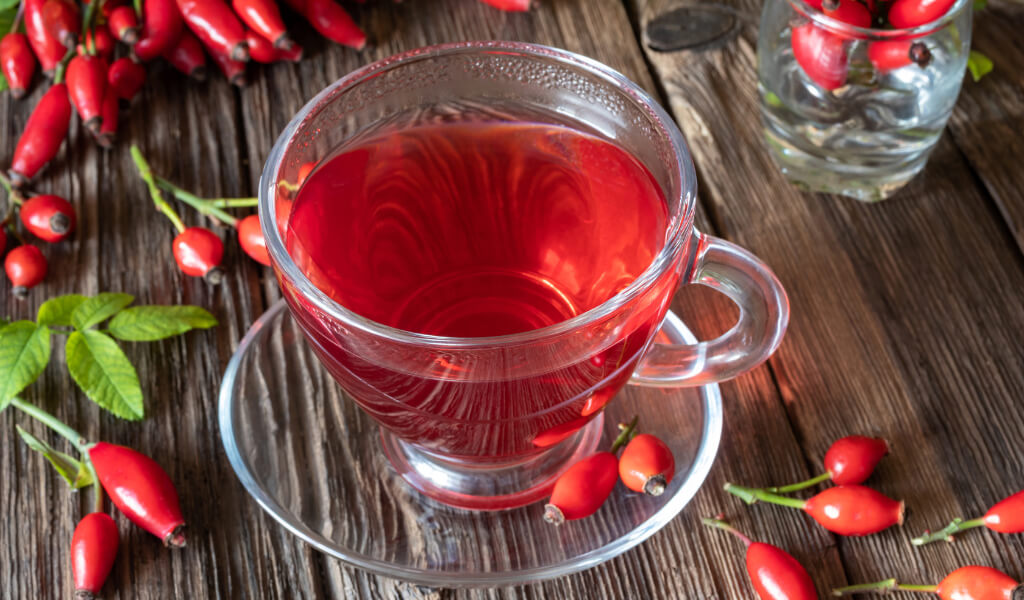Did you know that according to the Tea Association of the USA, specialty teas, such as Rose Hip tea, account for 24% of all tea consumed in America?
A perfect blend of delightful taste and amazing health benefits – there’s a lot to love about this unique tea.
About all Rose Hip Tea
Originating from the Rose plant’s pseudo-fruits, Rosehip tea is a captivating infusion that embraces a beautiful blend of floral, sweet, and tart flavors.
What is Rose Hip Tea?
Rosehip tea is a delightful herbal brew made from the colorful pseudo-fruits of the Rosa Canina plant, also known as the Dog Rose. These vibrant orange and red berries, hailing from Asia, Europe, and North Africa, are dried and brewed into a delicious and beneficial tea.

What does Rosehip tea taste like?
Rose hip tea has a similar flavor to hibiscus tea: it’s tart, like cranberry juice. Prepare your herbal tea by ordering fresh Rose hips online, drying them yourself, and steeping them in boiling water.
Picture a harmonious fusion of green apple’s freshness, ripe plum’s sweetness, and hibiscus tea’s tanginess, all in one delightful brew. This tea boasts a deep red color, exuding a sweet and tangy aroma with a subtle hint of rose. Elevate its natural sweetness with a touch of agave or honey for a truly enticing and satisfying infusion.
Read More: What is tea? Uncovering Types, Ingredients, Flavors & More
Does Rose hip tea have caffeine?
Rosehip tea contains no caffeine and can be made with either fresh or dried Rosehips. Rosehips can be taken as a loose leaf tisane or in tea bags. Rosehip tea is frequently featured in herbal tea mixes.
Rosehip tea is completely devoid of caffeine, making it a perfect drink anytime, anywhere in the world – from the United States to Asia.
Benefits of Rosehip tea
Loaded with vital nutrients and antioxidants, this herbal concoction presents many health benefits, from boosting your immunity to aiding digestion.
Here’s a closer look at some of the Rosehip tea benefits.
| Health Benefit | Summary |
| Digestive Aid |
Rosehip tea supports a healthy gut with antioxidants and flavonoids, aiding digestion and reducing inflammation.
|
| Improve Immunity |
Rich in vitamins C and A, Rosehip tea boosts immunity and fights off common ailments, thanks to antioxidants and flavonoids.
|
| May be available for Weight Loss |
Contains salidroside, which may aid in weight loss, although more research on Rosehip tea is needed for confirmation.
|
| Control Heart Health |
High in antioxidants like vitamin C and flavonoids, Rosehip tea may reduce heart disease risk factors and improve blood flow.
|
| Prevent Rheumatoid Arthritis |
Rosehip tea’s anti-inflammatory compounds may help alleviate joint pain, although more research is necessary.
|
| Rich in Antioxidants |
Rosehip tea is packed with antioxidants, protecting against cell damage and potentially guarding against chronic diseases.
|
| Prevent Type 2 Diabetes |
Emerging research suggests Rosehip tea may help reduce the risk of type 2 diabetes, but more studies are required.
|
| Decrease Inflammation and Pain |
Rosehip tea’s anti-inflammatory properties may offer relief from chronic pain and inflammation in various health conditions.
|
| Fight Skin Aging |
Rich in vitamin C and carotenoids, Rosehip tea may promote youthful skin, combat aging signs, and improve skin health.
|
It is useful for digestive Aid
One of the often-overlooked benefits of Rosehip tea is its potential as a digestive aid. As a rich source of antioxidants and flavonoids, this herbal tea can help promote a healthy gut.
By combating inflammation and supporting gut health, Rosehip tea aids digestion, making it a great addition to your diet to enhance your digestive health.
Improve Immunity
Rosehip tea is famous for its immune-boosting power, thanks to its high levels of vitamin C and vitamin A. These nutrients strengthen your immune system, helping to prevent common illnesses such as colds and the flu.
Additionally, its rich content of antioxidants and flavonoids helps to combat oxidative stress, thereby supporting overall immune health.
May be available for weight Loss
Rosehip tea might be a valuable ally in your weight loss journey, thanks to a potent antioxidant known as salidroside in the Rosa canina plant. Tiliroside is believed to have fat-burning capabilities, making Rose hip tea an ideal beverage for those aiming to shed extra pounds.
Research suggests that Rosehip extract can significantly reduce body weight and stomach fat. This was evident in an 8-week study involving mice prone to obesity and a 12-week study with 32 adults having excess weight.
Please note that the existing research mainly focuses on concentrated Rosehip extract rather than specifically on Rosehip tea. This suggests the necessity for further studies to investigate the effects of Rosehip tea on weight loss.
Furthermore, Rosehip tea is a low-calorie option, containing only four calories per cup, ideal for those watching their calorie intake. Research indicates that it lowers ghrelin, the hunger hormone, and enhances leptin, which governs energy balance. These benefits are likely due to Rosehip tea’s abundant antioxidants.
Read More:
Control Heart Health
Rosehip tea could be heart-healthy thanks to its high antioxidant content, particularly vitamin C and flavonoids. Research links vitamin C intake to reduced risks of heart disease, with at least 500mg of vitamin C supplementation daily associated with a significant decrease in LDL (bad) cholesterol and blood triglycerides, two heart disease risk factors.
Insufficient vitamin C intake has also been correlated with an increased risk of heart disease mortality. On the other hand, flavonoids found in rose hips are known to improve blood pressure in people with elevated levels and enhance blood flow to the heart.
In a 6-week study involving 31 adults with obesity, those who consumed a drink containing rosehip powder daily saw improved blood pressure and LDL cholesterol levels. The potential benefits could be partly attributed to the powder’s rich fiber content, which is lacking in rosehip tea. This highlights the necessity for further research, specifically focusing on rosehip tea.
The anti-inflammatory properties of rosehip tea also contribute to better blood flow and circulation, helping prevent arterial clogs and plaque buildup, often leading to heart attacks. This makes rose hips for tea potentially beneficial for individuals with high blood pressure and those at risk of cardiovascular disease.
It Could Prevent Rheumatoid Arthritis
Drinking tea from Rose hips could benefit those with rheumatoid arthritis, thanks to its high content of polyphenols and galactolipids. These compounds are celebrated for their potent anti-inflammatory properties and potential to alleviate joint pain.
In three study reviews, supplementing with Rosehip significantly reduced joint pain among individuals with osteoarthritis. Those supplemented with Rosehip reported improved pain levels, twice as likely as the placebo group.
Additionally, a 4-month study involving 100 people with osteoarthritis revealed that daily supplementation with 5 grams of Rosehip extract significantly reduced pain and enhanced hip joint mobility. In the Rosehip group, 65% reported some reduction in pain.
Notably, the current research on Rosehip’s anti-inflammatory benefits primarily involves concentrated extract, not tea, and the studies related to rheumatoid arthritis are limited, indicating a need for further exploration.
Read More:
Benefits of Rrose hips tea: Rich in antioxidants
Rosehip tea is a potent source of antioxidants, compounds known for their protective role against cell damage caused by harmful molecules called free radicals. Consuming antioxidant-rich foods and drinks like Rosehip tea may safeguard against chronic conditions such as heart disease, cancer.
In an antioxidant content study of six fruit extracts, Rosehip emerged with the highest antioxidant capacity, particularly rich in polyphenols, carotenoids, and vitamins C and E.
However, the antioxidant content in Rose hips can vary depending on the plant species, harvest time, and the altitude at which the plant was grown. Interestingly, plants from higher altitudes typically contain higher antioxidant levels.
While dried Rose hips may offer fewer antioxidants than their fresh counterparts, making Rosehip tea with fresh Rose hips instead of dried ones or tea bags could ensure a higher antioxidant intake, thus maximizing the health benefits.
Read More:
Preventt type 2 diabetes
Emerging research suggests that Rosehip tea could be beneficial in guarding against type 2 diabetes, though the exact mechanisms remain unclear. In a mouse experiment with a high-fat diet, adding Rosehip powder for 10-20 weeks resulted in notable reductions in blood sugar levels, fasting insulin levels, and liver fat cell growth. These changes are associated with an increased risk of type 2 diabetes.
Moreover, Rosehip extract significantly lowered fasting blood sugar levels in diabetic rats.
However, in an adult study with obese participants, daily supplementation with Rosehip powder didn’t significantly affect fasting glucose levels or insulin sensitivity. This result was consistent among individuals with healthy and impaired blood sugar levels.
Most of the current research focuses on Rosehip extract, and more studies are needed to elucidate the relationship between Rosehip tea and type 2 diabetes risk.
A double-blind, randomized, cross-over investigation published in the European Journal of Clinical Nutrition showed that daily intake of rosehip powder for six weeks resulted in significant decreases in blood pressure and high cholesterol levels among obese participants, which suggests a potential protective role against type 2 diabetes.
Read More:
- 11 Main Benefits of Palo Azul Tea for overall Heath
Decrease inflammation and pain
Rosehip tea is rich in compounds known for their anti-inflammatory effects, such as polyphenols and galactolipids, the primary types of fat found in cell membranes. These compounds have shown promising results in reducing joint pain.
Reviews of three studies indicate that Rosehip supplementation significantly reduced joint pain in individuals with osteoarthritis. Those supplementing with Rosehip were twice as likely to report improved pain levels compared to a placebo group.
Another four-month study with 100 osteoarthritis participants showed that daily supplementation with 5 grams of Rosehip extract resulted in less pain and enhanced hip joint mobility compared to a control group. Remarkably, 65% of the Rosehip group reported some reduction in pain.
While research on rosehip’s anti-inflammatory benefits mainly focuses on concentrated extract rather than tea, and studies related to rheumatoid arthritis are still limited, Rosehip tea may offer pain relief by decreasing chronic inflammation associated with various health conditions.
May fight skin aging
Drinking Rosehip tea may contribute to more youthful, resilient skin thanks to its richness in Vitamin C and carotenoids like astaxanthin. These substances encourage collagen synthesis and protect skin cells against sun damage.
Collagen, the most abundant protein in the human body, lends elasticity to the skin, and its increased production can maintain the skin’s firmness and youthfulness.
Further, astaxanthin in rosehip tea prevents collagen breakdown, providing anti-aging benefits. Other carotenoids like Vitamin A and lycopene, which shield skin cells against sun damage, add to rosehip tea’s potential skin benefits.
An eight-week study showed that individuals who consumed 3 grams of rosehip powder daily experienced fewer crow’s feet wrinkles, and their skin’s moisture and elasticity improved.
Though it’s unclear if rosehip tea imparts similar benefits, it’s antioxidant and vitamin-rich profile suggests the potential for enhancing skin health and combating aging signs like wrinkles and fine lines.
Moreover, the antioxidants in rosehip tea may help alleviate acne by reducing inflammation and redness, further contributing to improved skin tone and texture.
Read More:
What Are The Side Effects of Rosehip Tea
Besides rose hips tea benefits, there are also many side effects
Pregnancy and Breastfeeding
While rosehip tea generally causes no severe side effects in healthy adults, its safety and efficacy have not been sufficiently researched in pregnant or breastfeeding women. Therefore, these individuals should consult their healthcare provider before introducing rosehip tea into their diet.
Interactions with Medications
Rosehip tea can interact with certain medications due to its high Vitamin C content and diuretic effect. Individuals taking lithium, a common psychiatric drug, should avoid rosehip tea. The diuretic property of the tea could increase lithium concentrations in the body, potentially leading to severe side effects.
Furthermore, rosehip tea may interact with medications such as blood thinners, estrogen, and Prolixin. Individuals with Type 2 diabetes or on any serious medication should consult their doctor before consuming rosehip tea.
Allergies and Irritation
People with rosehip allergies should refrain from consuming rosehip tea, as it can trigger allergic reactions. This may also extend to those sensitive to roses or related plants.
Symptoms of an allergic reaction may include hives, rash, itching, swelling, difficulty breathing, sneezing, watery eyes, or a skin rash. In such cases, immediate medical attention is recommended.
Additionally, some individuals may experience gastrointestinal upset, a common side effect of rosehip tea. This can manifest as nausea, vomiting, diarrhea, and abdominal pain. Ingesting excessive amounts of rosehip tea may also lead to discomforts, such as stomach cramps and irritation, headaches, dizziness, and nausea.
Due to its high vitamin C content, rosehip tea may increase the risk of kidney stones or other disorders in certain individuals. Therefore, those with kidney conditions should seek medical advice before consuming rosehip tea. Generally, moderate consumption, two to three cups per day, is advised to minimize potential side effects.
In conclusion, while rosehip tea is typically safe for most people, its potential side effects and interactions should not be ignored. Always consult a healthcare professional before introducing new substances into your diet, especially if you have existing medical conditions or are on medication.
Read More:
The Bottom Line
In short, what is rosehip tea good for? Rosehip tea may enhance your immune system, promote weight loss, alleviate joint discomfort, improve skin appearance, and safeguard against heart disease and type 2 diabetes, thanks to its abundant antioxidants.
From boosting immunity to potentially reducing inflammation, pain, and risk of type 2 diabetes, the rose hip tea benefits tea are vast. Moreover, it may promote youthful skin thanks to its collagen-protective properties.
However, while generally safe, individuals with certain health conditions or on specific medications should consult a healthcare professional before consumption.
Thanks from Spiriteadrinks.com
FAQs
Is rosehip tea good for sleep?
While rosehip tea isn’t specifically known for sleep benefits, its soothing, warm nature may contribute to relaxation before bedtime. It’s caffeine-free, making it a good option for evening consumption.
Who should not drink rosehip tea?
Individuals with rosehip allergies, certain health conditions, pregnant and nursing women, and those on specific medications like lithium should consult a healthcare professional before consuming rosehip tea.
Does rosehip increase estrogen?
Currently, no scientific evidence suggests that rosehip specifically increases estrogen levels. As with any herbal supplement, it’s best to consult a healthcare professional if you have hormone-related concerns.
What is the difference between rose tea and rosehip tea?
The main difference lies in the plant parts used. Rose tea is typically made from petals of the rose flower, while rosehip tea is brewed from rosehips, the fruit of the rose plant.
Is rosehip a superfood?
Yes, rosehip is often considered a superfood due to its high vitamin C content, abundant antioxidants, and potential health benefits, including immune support and skin health.
Does rosehip tea give you energy?
While rosehip tea isn’t a traditional energy drink, its high vitamin C content might provide a natural boost and support overall vitality due to its immune-boosting properties.
Does rosehip contain zinc?
Yes, rosehips contain zinc, although the concentration is lower than its high vitamin C content. Zinc contributes to immune health, making rosehip tea a good choice for immune support.
Which is better, rosehip or vitamin C?
It’s not necessarily a matter of better, but rather different sources of vitamin C. Rosehip is a natural source of vitamin C with additional nutrients, while vitamin C supplements offer a concentrated dose of this vitamin alone.
Does rosehip have more vitamin C than lemon?
Yes, gram for gram, rosehip has significantly more vitamin C than lemons. This makes rosehip tea an excellent choice for those looking to boost their vitamin C intake.
How much vitamin C is in rosehip tea?
The amount of vitamin C in rosehip tea can vary based on the brewing process and the quality of the rosehips used. However, rosehips are known to be one of the richest plant sources of vitamin C.
Does heat destroy vitamin C in rosehips?
Heat can degrade vitamin C, but the impact on rosehip tea is likely minimal as the infusion process doesn’t typically reach temperatures high enough to destroy this nutrient completely. To retain maximum vitamin C, avoid boiling the tea and consider shorter steeping times.
Pictures of Rosehips tea









I’m Shanna, creator of Spiritea Drinks. I’m all about teaching people to grow their own food, tea, cook what they harvest, and eat with the seasons.









